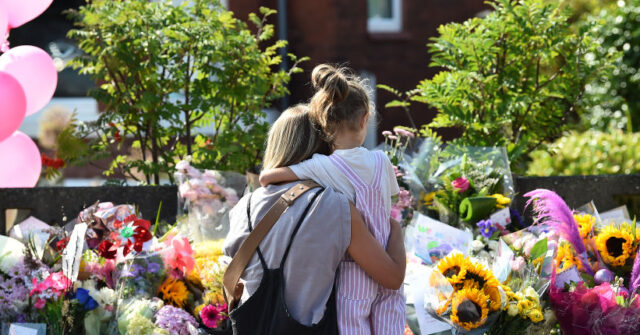The public has been asked not to lay floral tributes to “one of the most egregious crimes in our country’s history”, a year after a flower memorial at the scene of the Southport child killings became a flashpoint for discontent.
Sefton Metropolitan Borough Council, the local authority which includes the town of Southport, where a mass knife attack last July saw three young children slain and eight others grievously wounded at a summer holiday dance workshop, has moved to prevent any spontaneous memorials not coordinated by the government to the victims.
In a statement published on Tuesday, hours before the Southport Inquiry opened, the Council said flowers should not be laid at the scene of the attack, nor at the schools attended by the victims. Instead, the council said that they “want everyone to know there has been an incredible amount of consideration, thought and planning” put into official events.
“Our colleagues have been working with faith and community leaders,” Sefton Council said, noting locally flags would also be lowered to half-mast on public buildings.
The British government, which generally tightly controls spontaneous public reactions to mass-casualty events to prevent further disorder, appeared to have been caught flat-footed by the 2024 Southport attacks. Prime Minister Sir Keir Starmer was even placed in a position by his handlers where members of the public heckled him as he made a brief stop to lay a floral wreath at the scene of the attack last year.
Events continued to spiral out of the government’s control to the point of a summer of anti-child killing protests becoming anti-mass migration riots following the slayings.
Indeed, it is at the very location where the Prime Minister was heckled with shouts including “How many more children are going to die on our streets, Prime Minister?… How many more children, Prime Minister? Are you going to do something?”, that new tributes have been blocked a year later.
It comes as the Southport Inquiry heard its first submissions on Wednesday, including testimony from the parents of four children who were physically and psychologically injured in the attack, but not killed. Inquiry chair Sir Adrian Fulford opened proceedings by stating there had been a “wholesale and general failure” to protect the public from Rwandan-heritage knifeman Axel Rudakubana, calling the stabbings “one of the most egregious crimes in our country’s history”.
The parents of Child C8 — all survivors have been granted anonymity — told the inquiry she’d seen “something no parent should ever see”. Her child “remembers the attack vividly”, the mother said, including “how he tried to get her face, how she saw other girls being hurt.”
Being stabbed by Rudakubana had totally changed the child, the parent said, stating her daughter is now “hypervigilant”. She said, Sky News reports: “She must always know where the exits are. She constantly scans people and places for danger.”
This has made being in public places difficult for the once “independent and joyful child”, the mother said. She continued: “She is hyper aware of people she doesn’t know, and has expressed fear of men, particularly those who are black, influenced by the traumatic associations she made during the incident. This has led to difficult but necessary conversations about race.”
Another parent described being shown security camera footage of her daughter, who was stabbed in the back 20 times, being dragged back into the building after she tried to escape. She said her daughter had tried to feel empathy for the knifeman, and sometimes asked herself: “What his life may have been like to do this. ‘Did he have friends? Were people not kind to him?’ She asks me, confused, ‘Could he not talk to his parents if he had big feelings. Why did no one help him?”.
This left her having to help guide her child “through questions with impossibly difficult answers,” she said.
The inquiry has now adjourned after two days and will resume hearing evidence in September.
Read the full article here
